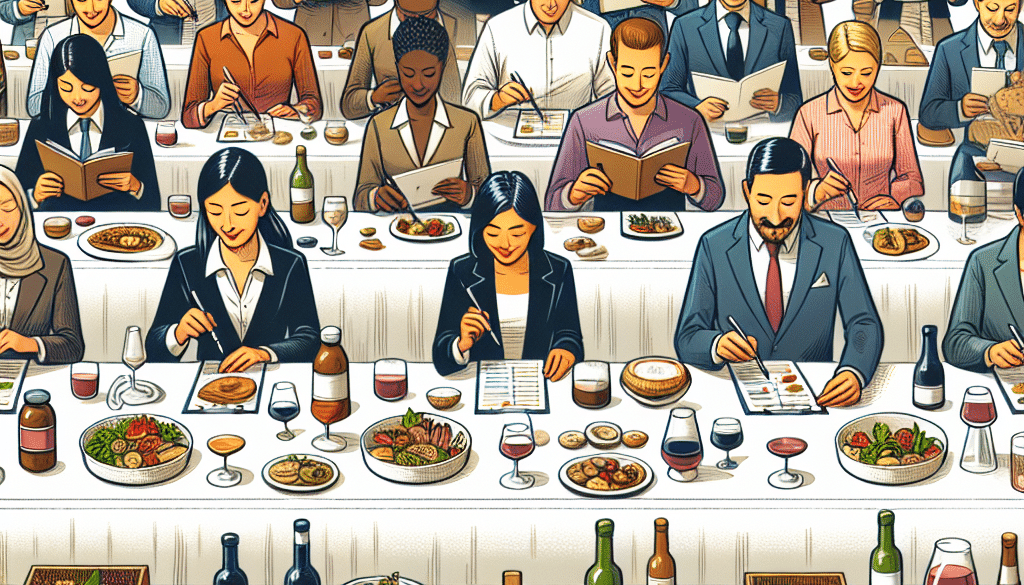Tasting Basics for Food & Bev Professionals: Become a Better Taster
-
Table of Contents
- Become a Better Taster: Tasting Basics for Food & Bev Professionals
- Understanding the Science of Taste
- Developing Your Palate
- Conducting Professional Tastings
- Applying Tasting Skills in Various Roles
- Case Studies and Statistics
- Conclusion: Key Takeaways for Becoming a Better Taster
- Enhance Your Offerings with ETChem’s Protein Products
Become a Better Taster: Tasting Basics for Food & Bev Professionals

For professionals in the food and beverage industry, the ability to taste and evaluate products critically is a fundamental skill. Whether you’re a chef, a sommelier, a food critic, or a product developer, understanding the nuances of flavor, aroma, and texture can make a significant difference in your career. This article will delve into the essentials of becoming a better taster, offering practical advice and insights that can be applied across various sectors of the industry.
Understanding the Science of Taste
Taste is a complex sense that involves more than just the tongue. It’s an intricate interplay between taste buds, olfactory senses, and even visual and tactile perceptions. To become a proficient taster, one must first understand the basic tastes: sweet, salty, sour, bitter, and umami. Each of these tastes is detected by specific receptors on the tongue and can be influenced by factors such as temperature, texture, and even one’s emotional state.
Developing Your Palate
Developing a refined palate is a process that requires practice and attention to detail. Here are some steps to enhance your tasting abilities:
- Expand Your Flavor Library: Expose yourself to a wide range of flavors. Try new foods and beverages regularly to familiarize yourself with different taste profiles.
- Practice Mindful Eating: Pay close attention to the flavors and textures you experience while eating. Avoid distractions and focus on the sensory aspects of your food.
- Learn the Language: Familiarize yourself with descriptive terms used in the industry to articulate your sensory experiences accurately.
- Keep a Tasting Journal: Document your tasting experiences to track your progress and recall specific sensory details.
Conducting Professional Tastings
Professional tastings are structured to minimize bias and maximize the accuracy of sensory evaluation. Here are some guidelines to follow:
- Control the Environment: Conduct tastings in a neutral environment, free from strong odors or distractions.
- Use the Right Glassware: Choose appropriate glassware that enhances the beverage’s aroma and flavor.
- Follow a Tasting Order: Taste from light to heavy, or from sweet to bitter, to prevent palate fatigue.
- Cleanse Your Palate: Between samples, cleanse your palate with water or a neutral food like plain crackers.
Applying Tasting Skills in Various Roles
Different roles within the food and beverage industry require unique applications of tasting skills. Here are some examples:
- Chefs: Use tasting to balance flavors and create harmonious dishes.
- Sommeliers: Evaluate wines for quality, pairing potential, and aging capacity.
- Food Critics: Critique dishes based on a comprehensive understanding of taste and culinary trends.
- Product Developers: Assess new products for market suitability and consumer appeal.
Case Studies and Statistics
Real-world examples and data can provide valuable insights into the importance of tasting skills. For instance, a study by the Culinary Institute of America showed that systematic tasting training improved culinary students’ ability to identify flavors by 20%. Additionally, a survey among sommeliers revealed that continuous tasting practice was the most critical factor in their professional development.
Conclusion: Key Takeaways for Becoming a Better Taster
To become a better taster, food and beverage professionals should focus on understanding the science of taste, developing their palate, conducting professional tastings, and applying their skills in their specific roles. By following these guidelines and incorporating regular practice, professionals can enhance their sensory evaluation capabilities and contribute more effectively to their industry.
Enhance Your Offerings with ETChem’s Protein Products
For food and beverage professionals looking to improve their product offerings, ETChem’s protein products are an excellent choice. Their high-quality collagens are perfect for a variety of applications, from nutritional supplements to food and beverage products. With a neutral taste and instant solubility, ETChem’s collagens can help you create products that stand out in the market. Consider incorporating their protein solutions into your next project for an added edge in taste and quality.
About ETChem:
ETChem, a reputable Chinese Collagen factory manufacturer and supplier, is renowned for producing, stocking, exporting, and delivering the highest quality collagens. They include marine collagen, fish collagen, bovine collagen, chicken collagen, type I collagen, type II collagen and type III collagen etc. Their offerings, characterized by a neutral taste, instant solubility attributes, cater to a diverse range of industries. They serve nutraceutical, pharmaceutical, cosmeceutical, veterinary, as well as food and beverage finished product distributors, traders, and manufacturers across Europe, USA, Canada, Australia, Thailand, Japan, Korea, Brazil, and Chile, among others.
ETChem specialization includes exporting and delivering tailor-made collagen powder and finished collagen nutritional supplements. Their extensive product range covers sectors like Food and Beverage, Sports Nutrition, Weight Management, Dietary Supplements, Health and Wellness Products, ensuring comprehensive solutions to meet all your protein needs.
As a trusted company by leading global food and beverage brands and Fortune 500 companies, ETChem reinforces China’s reputation in the global arena. For more information or to sample their products, please contact them and email karen(at)et-chem.com today.




